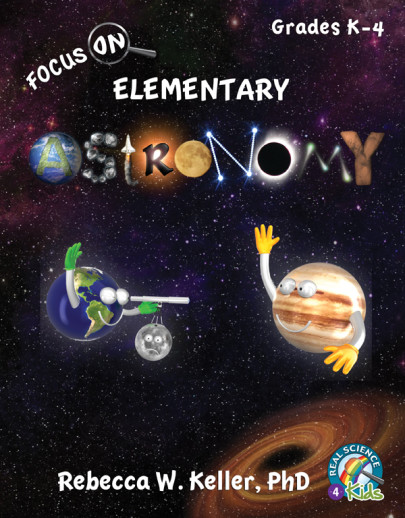We use cookies to make your experience better. To comply with the new e-Privacy directive, we need to ask for your consent to set the cookies. Learn more.
Focus On Elementary Astronomy Text
If you have a youngster who is bored with the amount of information they read about in their science text and hungers for more "grown-up" science, you might take a look at Real Science for Real Kids. Dr. Rebecca Keller has now introduced a Pre-Level 1 program, designed to introduce children as young as kindergarten to the wonders of science. This program contains the same basic components as its upper elementary cousin but is scaled back a bit for younger grades.
The necessary course components include a hardcover textbook, a paperback student workbook, a teacher guide. The packages include all of these components and a set of lesson plans (as a downloadable PDF), allowing you to create a schedule that works best for you.
The hardcover texts contain sixteen chapters, each divided into smaller, more specific sub-topics. The size of the book is a bit smaller for small hands, but the font and graphics are larger, designed for children to read on their own or listen while it is read to them. The chemistry text covers an impressive range of topics, including atoms, molecules, bonding, reactions, acids, bases, mixtures, food and taste, molecular chains, and more. The text pages combine simply written, clear, but interesting text with colorful graphics and diagrams that add fun and visual interest to every page. Each chapter ends with a summary of important points to remember. The student workbook, which is a bound, paperback book at this level, contains consumable lab activities and questions for each chapter. The questions included are fairly straight-forward, requiring only short answers, and students are also often asked to draw results and other observations. Unlike the experiments included in the notebook pages for grades 4-5, these experiments wrap up with an explanation of what students should have observed during the activity and why. Experiments in Chemistry include: using a cabbagejuice acid-base indicator, mixing various types of liquids together, "un-mixing" variousmixtures, and observing chemical reactions by making "goo." The teacher's manual is primarily designed to guide teacher and student through the experiments. Each chapter of the teacher's manual focuses on the experiment, and includes a list of materials, suggestions for guiding the discussion, more detailed procedural notes, and answers to the questions in the experiments. Please note that review pages are not present at this level.
The content of the Physics book includes what is physics, push and pull, kinds of energy, when things move, chemical energy, electricity, moving electrons, magnets, light and sound, and saving energy. The chapters in the Biology book cover life, cells, food for plants, plant parts, growing a plant, protozoa and what they eat, butterflies, frogs, and our balanced earth. Astronomy is the new addition this year and includes chapters on Exploring the Cosmos, the telescope, the Earth, moon and sun, earth's neighborhood - planets, earth's neighborhood - solar system, beyond the neighborhood - stars, the Milky Way, galaxies, and other 'stuff' in space.
All in all, although some fairly advanced concepts are presented here, they are introduced in a way that is exciting (because it is more like "grown-up" science) and incorporates fun experiments. - Jess

